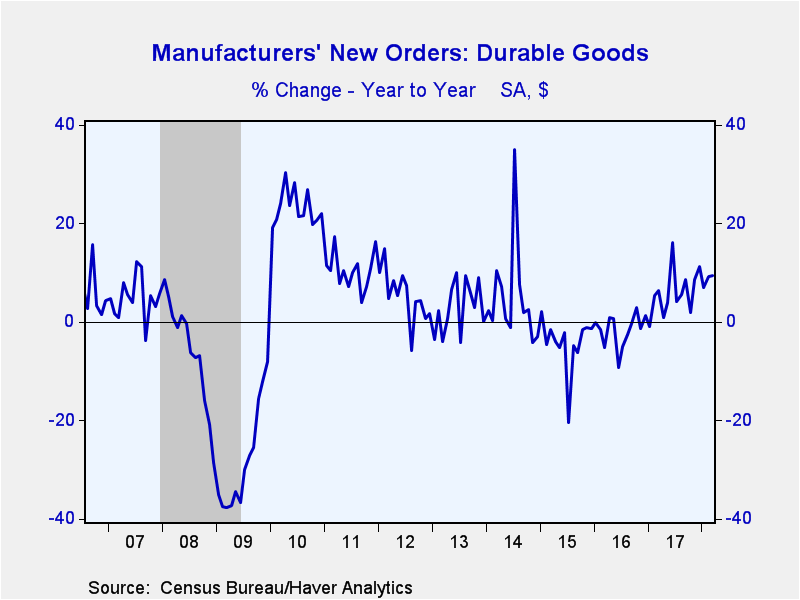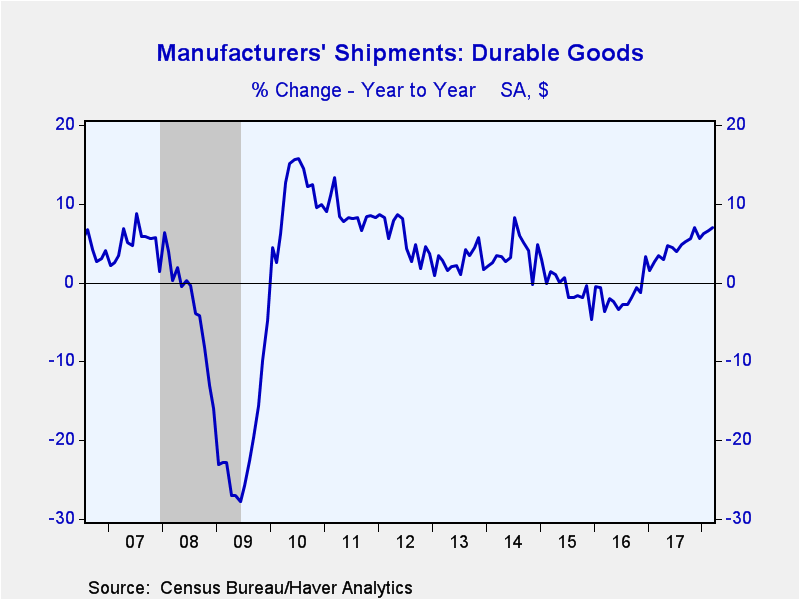 Global| Apr 26 2018
Global| Apr 26 2018U.S. Durable Goods Orders Strengthen; Aircraft Orders Surge
by:Tom Moeller
|in:Economy in Brief
Summary
New orders for durable goods increased 2.6% (9.5% y/y) during March following a 3.5% February rise, revised from 3.1%. Expectations had been for a 1.5% rise in the Action Economics Forecast Survey. Stronger orders for transportation [...]
New orders for durable goods increased 2.6% (9.5% y/y) during March following a 3.5% February rise, revised from 3.1%. Expectations had been for a 1.5% rise in the Action Economics Forecast Survey.
Stronger orders for transportation equipment provided the strength to the overall orders figure. They rose 7.6% (15.0% y/y) following an 8.9% gain. Aircraft orders surged 34.3%, about the same as in February. Civilian aircraft orders strengthened 44.5%, but defense aircraft bookings declined 9.4%. Motor vehicle & parts orders gained 0.1% after a 2.0% rise.
In the capital goods sector, orders increased 5.4% (14.9% y/y) after a 6.9% rise. Nondefense capital goods bookings gained 6.0% (15.8% y/y), but orders excluding aircraft & parts eased 0.1% (+7.0% y/y) after a 0.9% rise. Defense aircraft orders increased 0.9% (8.1% y/y) following a 15.3% increase.
Orders excluding the transportation sector were fairly stable (6.7% y/y) after an 8.9% increase. Orders for primary metals increased 1.4% (14.3% y/y) after a 4.3% rise, and fabricated metals orders improved 0.1% (6.9% y/y) following a 0.2% gain. A 1.3% increase (10.3% y/y) in computer & electronic product orders followed two months of slight decline. Communications equipment orders rose 8.2% (10.7% y/y) following a 7.5% decline. Computer orders declined 2.6% (-3.6% y/y), down for the fourth month in the last five. Electrical equipment, appliance & component orders were fairly steady (0.7% y/y) after a 3.2% increase. Machinery orders declined 1.7% (+5.3% y/y) after a 0.3% rise.
Shipments of durable goods improved 0.3% (6.9% y/y), following a 0.7% rise. Excluding transportation, shipments fell 0.4% (+6.7% y/y) after a 0.8% gain.
Unfilled orders for durable goods increased 0.8% (3.0% y/y) after a 0.3% rise. Backlogs of orders excluding transportation rose 0.7% (4.5% y/y) following three months of lesser increase.
Inventories of durable goods gained 0.1% (4.3% y/y), the weakest increase in nearly a year. Inventories excluding the transportation sector increased 0.4% (5.6% y/y) and repeated February's rise.
The durable goods figures are available in Haver's USECON database. The Action Economics consensus forecast figure is in the AS1REPNA database.
Hitting a Cyclical High: The Wage Growth Premium from Changing Jobs from the Federal Reserve Bank of Atlanta can be found here.
| Durable Goods NAICS Classification | Mar | Feb | Jan | Mar Y/Y | 2017 | 2016 | 2015 |
|---|---|---|---|---|---|---|---|
| New Orders (SA, % chg) | 2.6 | 3.5 | -3.6 | 9.5 | 5.9 | -1.7 | -4.6 |
| Transportation | 7.6 | 8.9 | -9.8 | 15.0 | 4.9 | -3.4 | -6.2 |
| Total Excluding Transportation | -0.0 | 0.9 | -0.3 | 6.7 | 6.5 | -0.7 | -3.6 |
| Nondefense Capital Goods | 6.0 | 5.8 | -1.0 | 15.8 | 7.8 | -7.1 | -11.0 |
| Excluding Aircraft | -0.1 | 0.9 | -0.3 | 7.0 | 5.3 | -4.6 | -4.3 |
| Shipments | 0.3 | 0.7 | 0.5 | 6.9 | 4.3 | -1.6 | -0.6 |
| Unfilled Orders | 0.8 | 0.3 | -0.3 | 3.0 | 1.9 | -1.7 | -2.0 |
| Inventories | 0.1 | 0.4 | 0.4 | 4.3 | 4.1 | -0.7 | 1.6 |
Tom Moeller
AuthorMore in Author Profile »Prior to joining Haver Analytics in 2000, Mr. Moeller worked as the Economist at Chancellor Capital Management from 1985 to 1999. There, he developed comprehensive economic forecasts and interpreted economic data for equity and fixed income portfolio managers. Also at Chancellor, Mr. Moeller worked as an equity analyst and was responsible for researching and rating companies in the economically sensitive automobile and housing industries for investment in Chancellor’s equity portfolio. Prior to joining Chancellor, Mr. Moeller was an Economist at Citibank from 1979 to 1984. He also analyzed pricing behavior in the metals industry for the Council on Wage and Price Stability in Washington, D.C. In 1999, Mr. Moeller received the award for most accurate forecast from the Forecasters' Club of New York. From 1990 to 1992 he was President of the New York Association for Business Economists. Mr. Moeller earned an M.B.A. in Finance from Fordham University, where he graduated in 1987. He holds a Bachelor of Arts in Economics from George Washington University.
More Economy in Brief
 Global| Feb 05 2026
Global| Feb 05 2026Charts of the Week: Balanced Policy, Resilient Data and AI Narratives
by:Andrew Cates










